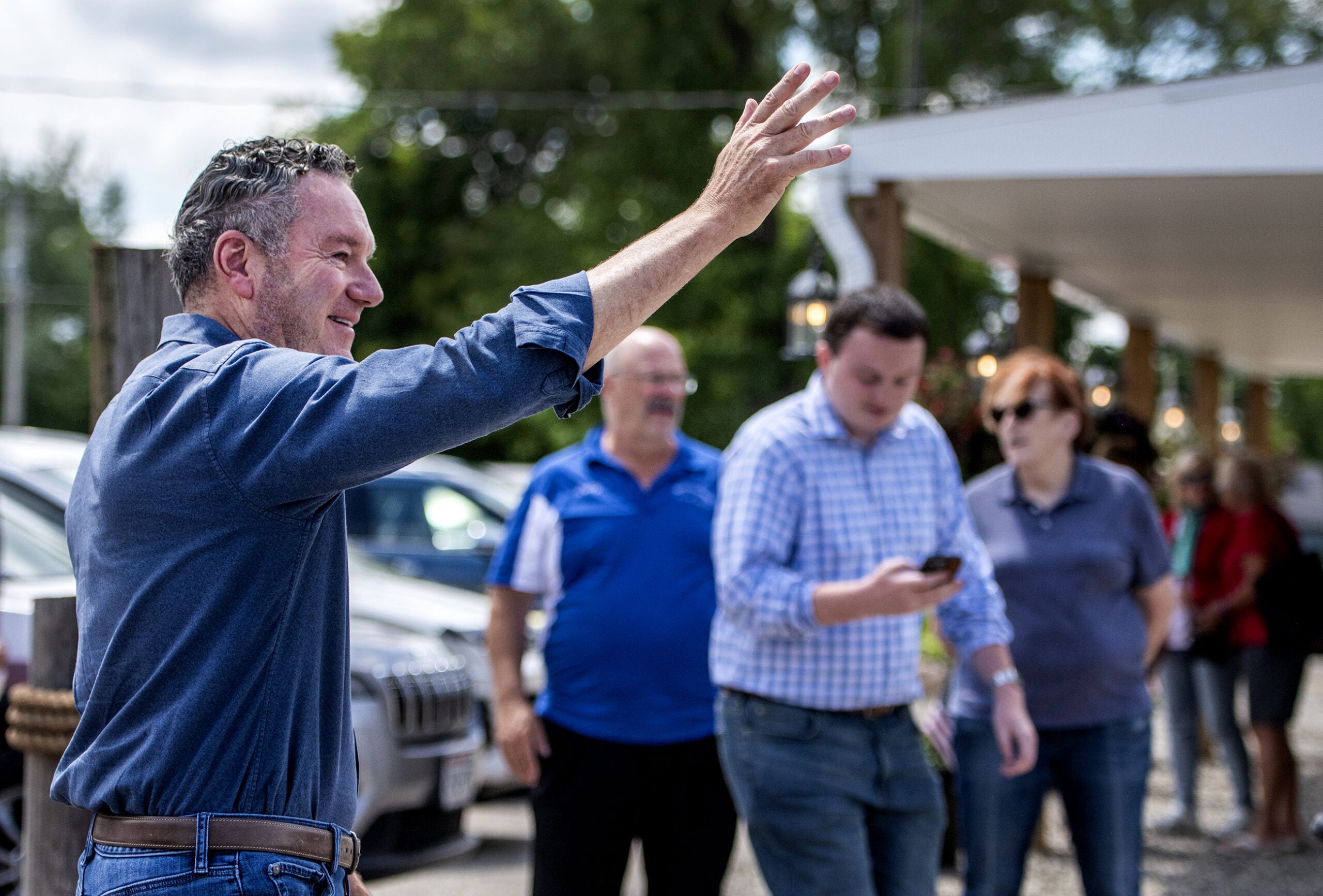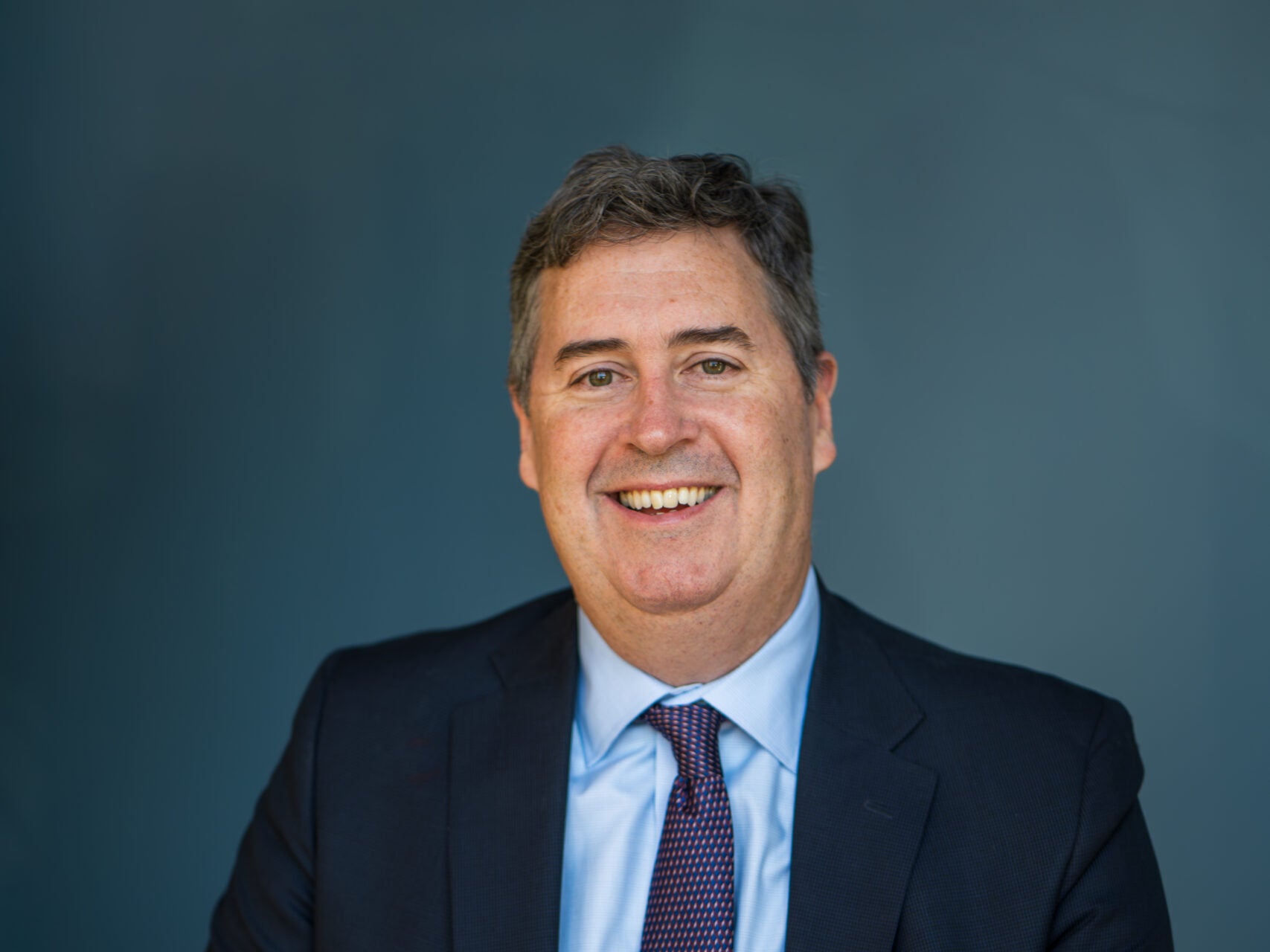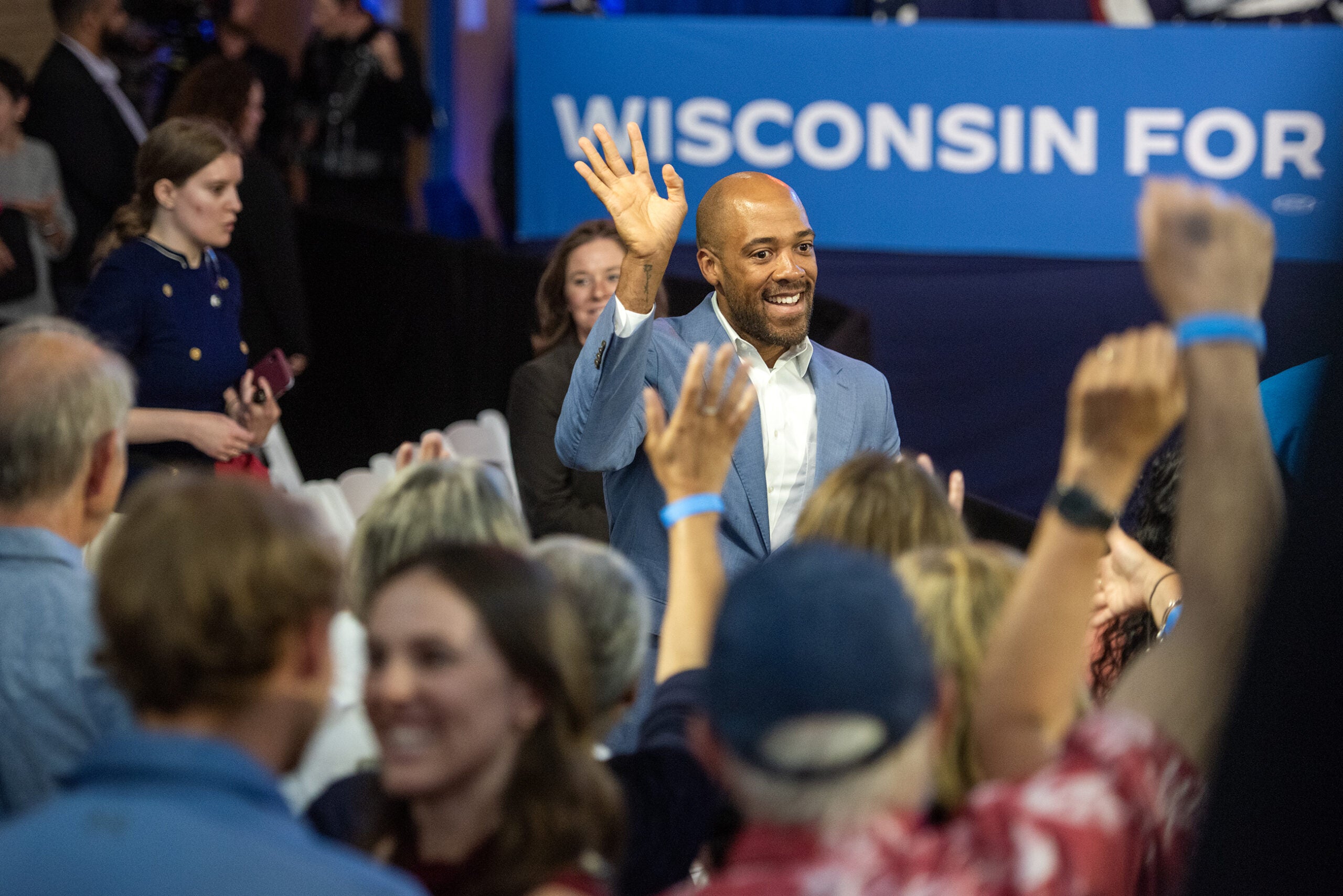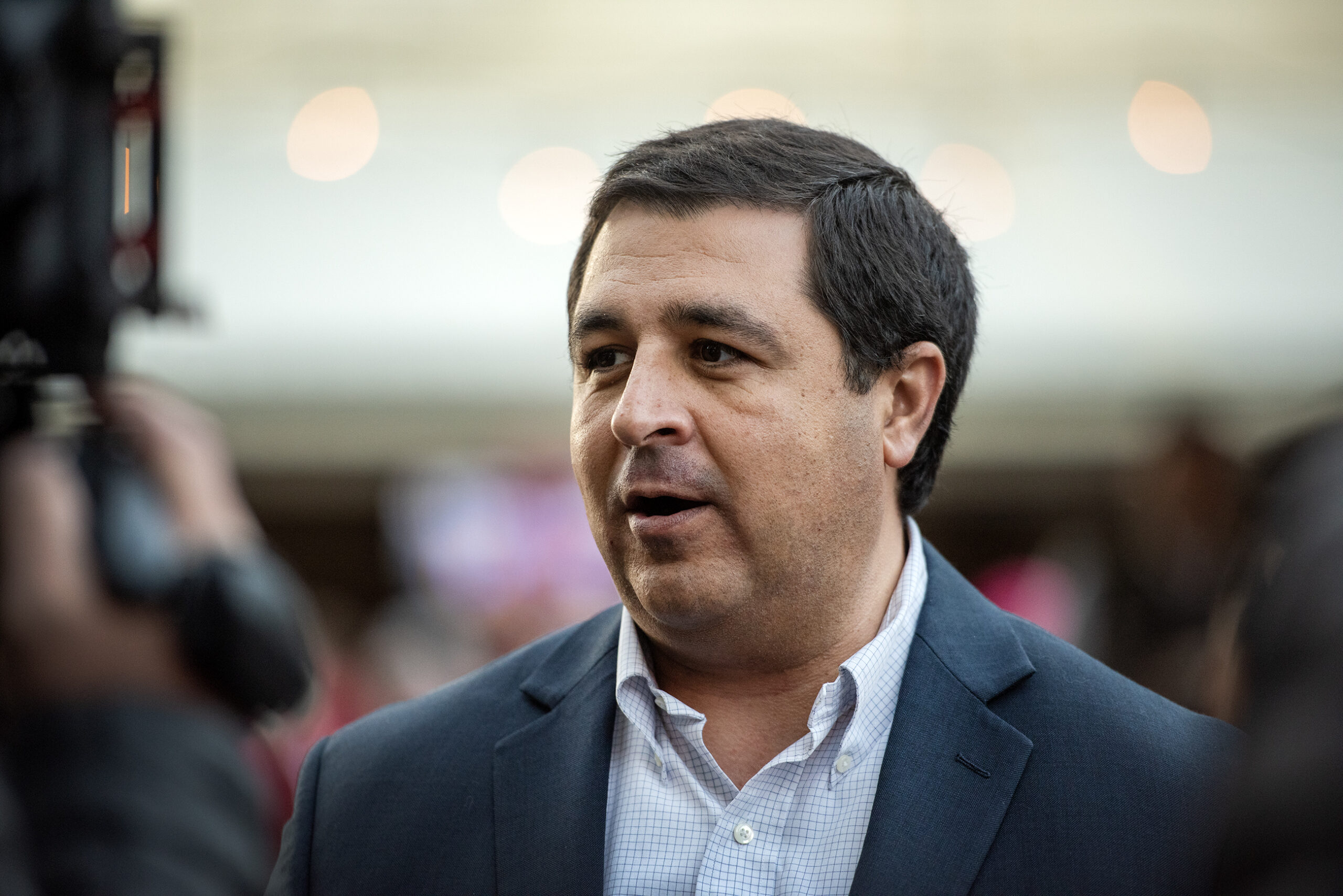Tim Michels was not a candidate for office until about three months ago. Today, he can make a plausible case that by next year, he could be governor.
It’s hardly a given, of course, but the millionaire construction executive’s rapid ascent in the polls has reshaped the race. He’s done it with a well-worn “political outsider” sales pitch, a coveted endorsement from former President Donald Trump and a whole lot of his own money.
Michels and his brothers own Michels Corporation, a Brownsville company started by their father that Michels says now employs more than 8,000 people. He told voters at an Eau Claire rally this month that he’s not running for office because he has to.
News with a little more humanity
WPR’s “Wisconsin Today” newsletter keeps you connected to the state you love without feeling overwhelmed. No paywall. No agenda. No corporate filter.
“I am not looking for a political career,” Michels said. “I’m 59 years old. I am doing this to serve. President Trump didn’t have to run for president, but he wanted to drain the swamp. I don’t have to run for governor, but I’m gonna go turn Madison upside down.”
Michels does not earn his living in politics, but he’s no political newcomer. He first ran for office in 1998, losing a Republican primary for state Senate to now-U.S. Rep. Scott Fitzgerald. In 2004, Michels ran for U.S. Senate, winning a GOP primary but losing the general election to former Democratic U.S. Sen. Russ Feingold.
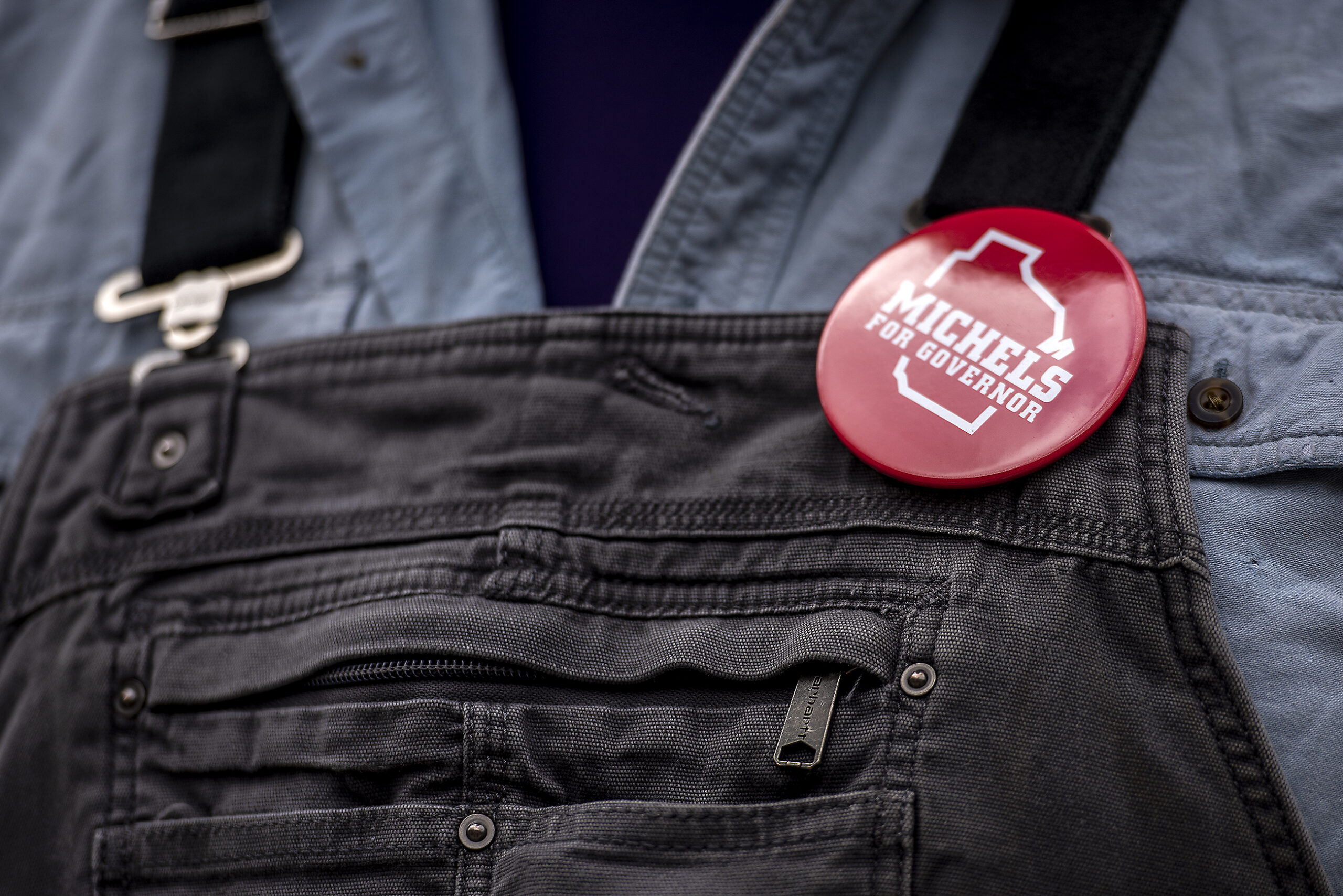
In the years since, Michels has remained a major GOP donor. He donated to a long list of candidates that includes Rebecca Kleefisch, now his top GOP rival, and former Gov. Scott Walker, her biggest supporter.
Michels has built his family business into a construction giant in a state where a growing number of Republicans have scrutinized state government’s support of the road-building industry, and Michels’ role in it. He employs union workers in a state where Walker made a national name for himself fighting organized labor.
And while Michels has laid out some of what he’d prioritize if elected, big questions remain about how he would govern. In some cases, that can allow his supporters to see in him whatever they prefer: a Trump-supporting conservative, a pragmatic businessman, or something else entirely.
“We don’t really know what we’re going to get from a Michaels governorship,” said University of Wisconsin-La Crosse political scientist Anthony Chergosky. “But that ambiguity can actually play to his advantage.”
Self-funded campaign, Trump endorsement fuel Michels’ surge
There’s nothing novel about Michels’ “political outsider” approach, but there’s a reason candidates make pitches like this. In the right election cycle, under the right circumstances, it can work.
“He’s not politics as usual,” said Michels supporter Kim Schimdt of Mondovi, who was in the crowd for his Eau Claire speech. “I’m tired of long-term politicians. I think everyone is.”
But a message like this only goes so far in politics. When Michels ran for U.S. Senate, he presented himself as an everyman candidate and military veteran, emphasizing his 12 years of service in the U.S. Army and painting Feingold as a career politician. Michels lost the race by 11 percentage points.
Even this year, Michels was not the first candidate to bang the outsider drum. Republican Kevin Nicholson launched his own campaign in January with a nearly identical message. It never took hold, and Nicholson was out of the race by early July.
But Michels has a couple other things going for him this year that have given his campaign a jolt.
“There is no bigger advantage in Republican Party politics than the Donald Trump endorsement,” Chergosky said.
Other candidates had coveted Trump’s support. Kleefisch and Nicholson both visited his Florida home to make personal appeals. Trump never announced publicly why he didn’t support them, but the Milwaukee Journal-Sentinel recently reported Trump didn’t like what he saw on the candidates’ Twitter feeds. Kleefisch once posted a picture of her daughter going to homecoming with the son of state Supreme Court Justice Brian Hagedorn, the conservative swing justice who ruled with the court’s liberals against Trump’s election lawsuit in 2020. Nicholson allegedly once liked or retweeted a tweet by Charlie Sykes, the longtime Milwaukee conservative talk radio host who has since built a national media career by criticizing Trump.
Some speculated that the former president might even give the nod to state Rep. Timothy Ramthun, the longshot candidate for governor who made a name for himself by pushing to overturn Joe Biden’s Wisconsin victory, which is legally impossible.
Michels also visited Trump to make a personal appeal. He said the two of them talked for more than an hour, with much of the discussion dominated by their mutual interest in construction.
Judging by the outcome, the two connected. In June, Trump announced in a written statement that Michels had won his support.
“Tim Michels has my Complete and Total Endorsement,” Trump said in a written statement announcing his decision.
Beyond the Trump factor, Michels has something else going for him this year that few candidates can match: personal wealth and a willingness to spend it.
On April 22, the day Michels formally declared his candidacy, he gave his campaign $1.2 million. By June 30, Michels had contributed nearly $8 million to his race, outspending his competitors and blanketing the TV airwaves.
“He has considerable personal wealth,” Chergosky said. “And he was willing to use it in a real show of force.”
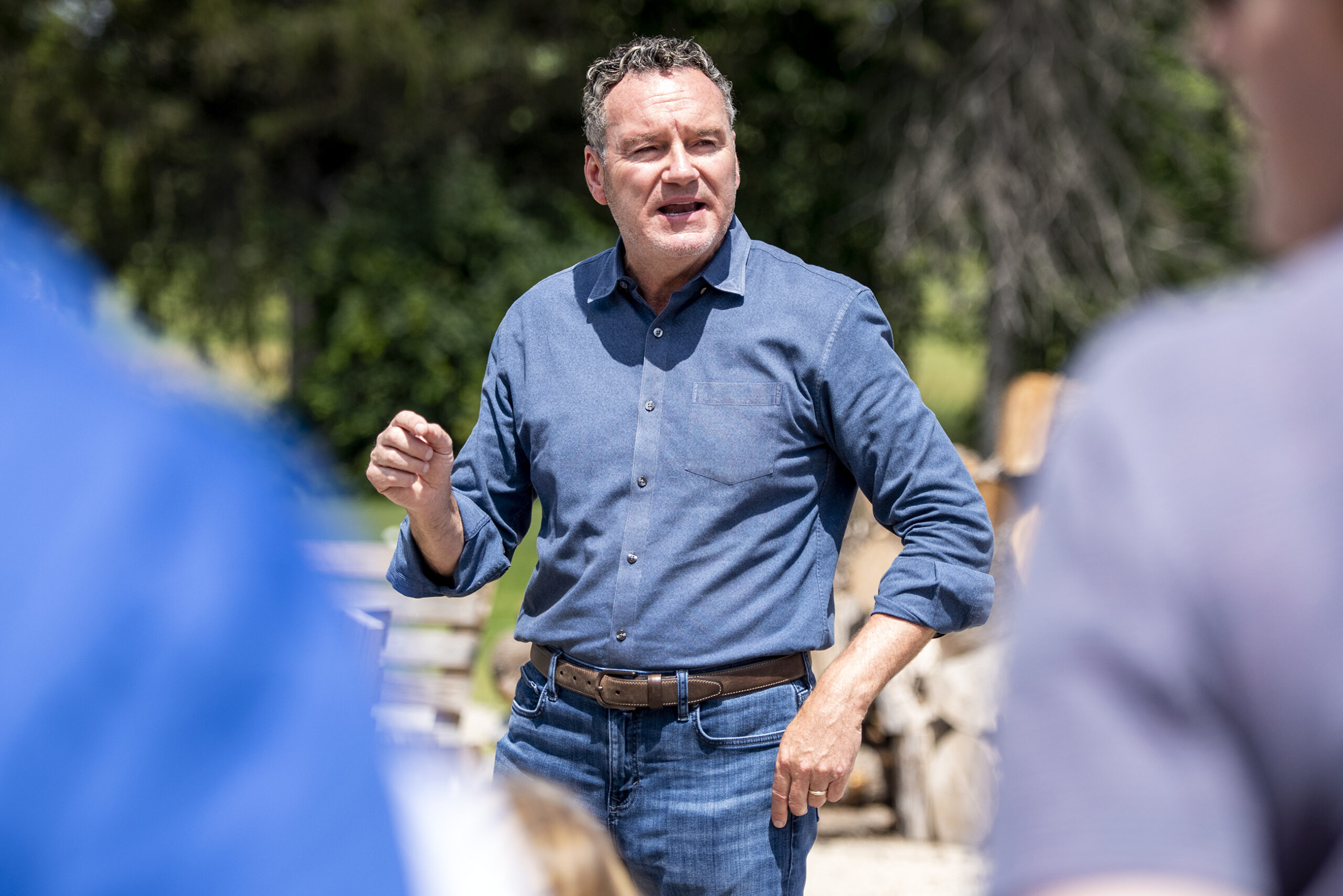
Walker, Kleefisch attack Michels’ record
There were signs almost immediately that Michels’ approach was working.
A June Marquette poll showed him virtually tied with Kleefisch. Later that month, he skipped a GOP debate, a cautious approach sometimes taken by frontrunners.
Perhaps most telling of all was how the Kleefisch campaign adjusted its strategy. Kleefisch began attacking Michels, with a big assist from Walker.
Walker, the Republican standard-bearer in Wisconsin for eight years, has leaned into this. He cut an ad for Kleefisch that attacks Michels for fighting “right-to-work,” in Wisconsin, the law Walker signed in 2015 banning mandatory union dues at private sector businesses. Michels Corporation was a member of the Wisconsin Contractors Coalition, a group that organized in 2014 to fight the proposal.
“I’m not criticizing him. I’m just pointing out the facts about his business,” Walker told Wisconsin Public Radio. “If you’re going to run as a successful businessman, then I think the average voter believes you should have to take responsibility for the positions that your business takes.”
In the same interview, it was Walker who brought up — unprompted — another potential campaign weakness for Michels: his decision to live part-time in Manhattan and Connecticut, where his kids went to school.
“Fair or not, Democrats — if Tim Michaels were the nominee — would go after him and question how he can make points about education in Wisconsin when his kids didn’t go to school here,” Walker said.
“To be clear, I’m not attacking him for that,” Walker added. “I’m just making an observation.”
The conservative news site Wisconsin Right Now reported on the east coast homes shortly after Michels entered the race for governor. The report noted Michels sold his first Connecticut house, purchasing a new one nearby in 2020 for $17 million. The Michels family maintains a residence in Hartland, Wisconsin.
When Michels was asked about the report by WISN-AM, he said he started spending time on the east coast after Michels Corporation was awarded a bid for a massive tunnel project in Manhattan.
While his kids were going to school there, Michels’ daughter developed a rare form of brain cancer. The family remained on the east coast while she underwent treatment, then stayed there as Michels’ son got involved in competitive sailing.
“Life brings circumstances and you just roll with them,” Michels said. “We did the right thing for our family. I did the right thing for the company. But I’ve always been a Wisconsin resident.”
Michels conceded that in 2015, during the peak of the tunnel project, he spent more days on the east coast than he did in Wisconsin.
“There was that one year where I did get, I call it ‘snagged,’ in New York for spending too many days out there,” Michels said. “You gotta go where the action is. I did the right thing.”
Walker has also attacked Michels for his ties to the Wisconsin Transportation Builders Association and the Transportation Development Association, groups that pushed for an increase to the gas tax that Walker opposed. Walker contends the road-building lobby was active in recruiting Michels.
“I think there’s a group of lobbyists and organizations in Madison that … were upset at me, upset at her, they were upset at us for not being willing to raise the gas tax,” Walker said.
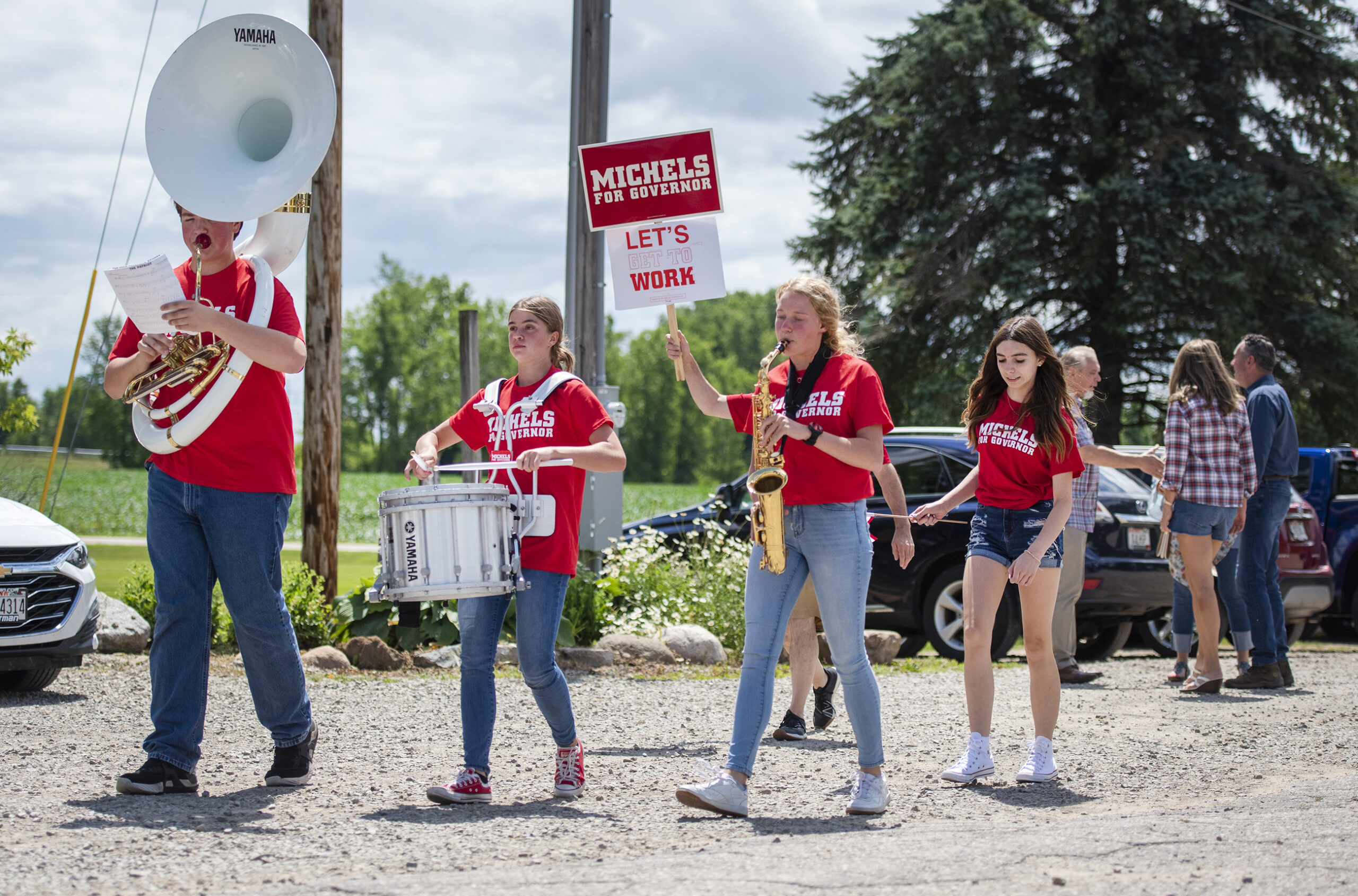
Questions remain about Michels’ record, agenda
Michels disputes the attacks, and has taken jabs at Walker and Kleefisch in return.
“This is a political smear,” Michels told reporters earlier this month in Oconto. “This is political garbage done by desperate candidates, career politicians who are finding themselves behind.”
On these issues, Michels has also responded by letting the public know where he stands now.
“I am for ‘right-to-work,’” Michels said. “And I am not for raising the gas tax.”
The spotlight of the campaign has also prompted Michels to take stands on some other issues. For example, in early July, his campaign didn’t respond when asked by the Journal-Sentinel whether he would ban emergency contraceptives, known as Plan B. By mid-month, he told reporters he would not ban them.
“I am against abortion,” Michels said. “I am not against contraception.”
Michels has also come under scrutiny for how he would handle his family’s business, which has done hundreds of millions of dollars worth of business with the state. Michels has said he would divest himself of the company if elected, but he’s also said he hopes the company would continue to seek state work.
Michels’ stump speech lists three priorities as governor. He tells voters he’s for “election integrity,” referencing a package of changes that includes eliminating the Wisconsin Elections Commission. He said he also wants to reduce crime and reform education.
On other issues, Michels has kept his options open.
During a recent debate, he was asked whether his plan to offer incentives to students for technical training would extend to DACA students, referring to the Deferred Action for Childhood Arrivals program for young people brought to the U.S. illegally by their parents.
“You know, I want to look at the details on everything before I agree to anything,” Michels said.
Even the endorsements Michels has picked up seem open to different interpretations. He was recently endorsed by Tommy Thompson, the longest-serving governor in Wisconsin history and a Republican who was known for his willingness to work with Democrats.
Then there’s Trump, who took combative politics to a new level. The former president will return to Wisconsin to campaign for Michels the weekend before the state’s Aug. 9 primary.
In a June interview with WPR, Michels wouldn’t say whether he’d certify Wisconsin’s presidential election results in 2024, a largely ceremonial responsibility of the governor that’s historically been treated as an afterthought. Calling on GOP governors to refuse to certify the popular-vote winner in states he lost was part of Trump’s strategy to try to overturn the 2020 election.
“I’m a businessman,” Michels said. “I don’t look forward like that into a crystal ball and say, hypothetically, ‘Here’s what I’m going to do if this or that happens.’ I’m a know-it-when-I-see it kind of guy.”
WPR is profiling candidates for governor and U.S. Senate ahead of the Aug. 9 primary election. This week, read profiles for gubernatorial candidates Rebecca Kleefisch, Tim Michels and Tim Ramthun. Next week, a series of profiles will focus on Democrats running for Senate.
Editor’s note: WPR’s Rich Kremer and Angela Major contributed reporting to this story.
Wisconsin Public Radio, © Copyright 2025, Board of Regents of the University of Wisconsin System and Wisconsin Educational Communications Board.

